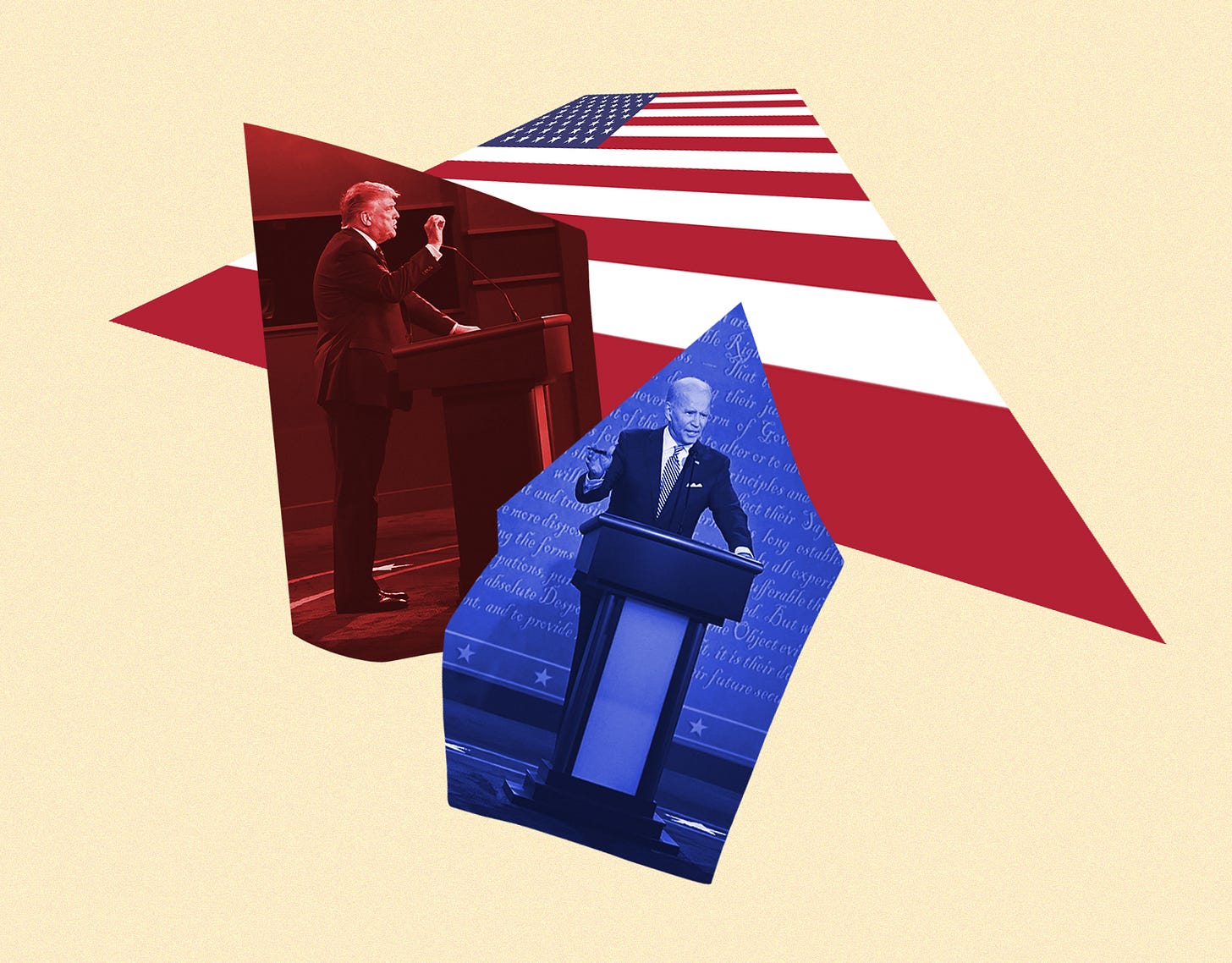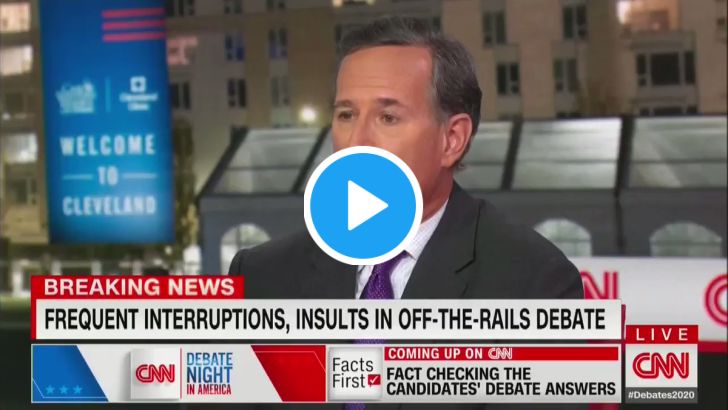1. False Equivalence
Let’s stipulate that most of the time, your perception of who wins a debate aligns closely with your priors. If you like Candidate X, you are likely to think that Candidate X won the debate.
I do not like Donald Trump. I think he probably “lost” the debate last night. But my opinion on that doesn’t really matter. That debate wasn’t for me and Trump’s performance wasn’t designed to resonate with people like me. I would bet the mortgage that for some segment of voters, Trump absolutely crushed it and gave them everything they wanted.
So let’s put aside the question of winning and losing. Instead, let’s focus on who is responsible for what happened on the stage in Cleveland.

Looking around the media landscape this morning, just about everyone is decrying how awful both Donald Trump and Joe Biden were. How boorish. How uncouth. How impolite. How unpresidential.
Here are some headlines:
“Insults Fly in Chaotic Presidential Debate” —Detroit News
“Trump, Biden Debate Descends into Chaos” —Orange County Register
“Yelling, Name-Calling Mark First Debate” —Denver Post
“Insults, Interruptions: Candidates take the stage—and shots at each other, when they’re not getting in each other’s way.” —Cleveland Plain Dealer
These headlines are so painfully, falsely equivalent that they don’t reflect the reality of what actually happened.
Imagine a newspaper reporting on the Soviet invasion of Poland in September of 1939 with a headline saying:
“Russians, Poles, trade fire in latest outbreak of violence.”
There is only one person responsible for what happened at the debate: Donald Trump.
It’s on him. Entirely.
Joe Biden tried to conduct himself in a normal manner.
He mostly abided by the rules of the debate. On the few occasions he did not and Chris Wallace admonished him, he deferred.
He mostly refused to come down to Trump’s level. On the few occasions he did sink, he did so plainly out of exasperation, not malice.
He mostly said things which were factually true. On the few occasions he did not, his factual errors were minor.
Was Biden’s performance close to perfect? No. He called the president of the United States a “clown” at least twice. He told the president to shut up.
On the other hand, he did not lie about the president’s children (as Trump did). He did not lie about the president’s policy proposals (as Trump did).
He did not encourage a white nationalist group to “stand by.” He did not refuse to tell his supporters to behave peacefully following the election.
These are not small things. There is no equivalence here.
Once again, Donald Trump has used the media’s desire to appear “fair” against America.
2. White Power
Two of Trump’s most craven enablers—Rick Santorum and Chris Christie—waddled out to the cameras to defend the president’s call for a white nationalist group to “stand by.” One of them did so honestly. The other did not. You’ll never guess which was which.
Chris Christie was the future of the Republican party once upon a time because he always talked straight and told uncomfortable truths. He sat down with George Stephanopoulos this morning and said:
STEPHANOPOULOS: You were part of the president's debate prep. How does he clean up this Proud Boys moment last night? Will he do it?
CHRISTIE: Well, listen, I think, again, George, I heard it differently last night when he said, sure, I will, right off the top in response to it but if there's any doubt about that we'll be able to clear it up.
STEPHANOPOULOS: He said stand up and stand by. He said stand by. That was a call to arms.
CHRISTIE: George, I didn't read it that way George, but listen, if you want to read it that way that's your prerogative.
AYFKM?
Meanwhile, Rick Santorum talked with CNN and told the truth:
SANTORUM: And [Wallace] asked—and he asked them for a reason, because he asked two questions where he was asking the president to do something that he knows the president doesn't like to do.
CNN: Which is?
SANTORUM: Which is, say something bad about people who support him. Right?
CNN: What, declining violence?
SANTORUM: Well, talking about—yeah, the white supremacists, number one.
That is what happened during the debate. It was not “two people interrupting one another and calling each other names.”
The president of the United States was asked to condemn white supremacists. He declined to do so, because white supremacists support him. And so instead of condemning them, he encouraged them.
Nothing like this has ever happened in the history of televised presidential debates.
Why was that not the headline in every newspaper in America today?
3. The Con Man
Great story from Toronto Life:
Shaun Rootenberg was born into a life of opportunity. His parents, Abraham and Vivienne Rootenberg, were immigrants from South Africa who moved to Toronto to become real estate agents and raise their four kids. Shaun, their youngest, attended the private United Synagogue Day School and then Crescent School in North Toronto. He was a strong athlete, a good math student and generally popular, but he was most gifted at self-mythologizing. He discovered early on that a well-placed lie could make him sound and feel more important than he was. One friend remembers Rootenberg as a chronic exaggerator. He’d claim to have scored high on nearly every test yet never finish the year atop the class, and he’d tell unbelievable stories of the many attractive girls he’d hooked up with during the summers.
After high school, Rootenberg studied at the University of Western Ontario. He tried out for varsity soccer but didn’t make the team, so he told friends he’d instead been recruited to play for the elite Maccabi Canada rep soccer team in Israel. According to one source, Rootenberg went so far as to buy the uniform and travel to Israel during the tournament.
By that time, Shaun’s siblings were establishing their careers: his brother Jonathan would become a renowned forensic psychiatrist, his sister Terry an occupational therapist and Michael a car salesman. Sources I spoke to said that while Rootenberg had a brilliant mind, he was a terrible speller and had trouble constructing a coherent paragraph. They suspected he had an undiagnosed learning disability.
After university, a friend offered him a job at a collections agency, and, left with no better options, he accepted. Hounding borrowers for repayment was hardly glamorous, but he was good at it. On the phone, he could be assertive and bend the truth as far as he needed to get the borrower to pay up. “I’m going to sue you,” he’d say in a flat, icy tone. “If you don’t pay, I’m going to take you to court.” After he was promoted to manager, he lied to his supervisors that he kept the Jewish Sabbath and he needed to leave early on Fridays and could never work Saturdays.




